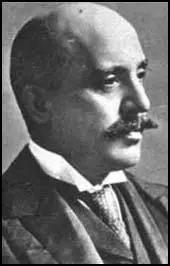Lord Cowdray

Weetman Dickinson Pearson, the son of George Pearson, the Conservative M.P. for Edinburgh University, was born in 1856.
Weetman Pearson went into business and by 1900 was the owner of S. Pearson & Son, a company employing 20,000 men building railways, docks, harbours, waterworks and drainage systems in Britain, Ireland, Mexico and China. The company was responsible for several very large projects including Dover Harbour and Blackwell Tunnel.
Pearson was elected Liberal M.P. for Colchester in 1895 and held the seat until 1910. Pearson owned Paddockhurst Estate in Worth and was a strong supporter of Charles Corbett, the M.P. for East Grinstead between 1906 and 1910.
On the outbreak of the First World War, Weetman Pearson's son Geoffrey, volunteered for the British Army. He was killed in France on 6th September, 1914.
Pearson, a close friend of the new prime minister, David Lloyd George, was granted the title Viscount Cowdray in December 1916. The following month he was appointed President of the Air Board. Cowdray worked hard to improve the output of aircraft and predicted that Britain would soon have more than was needed to defend Britain.
By the summer of 1917 the Royal Flying Corps was still short of aircraft. On May 25th 24 German bombers killed nearly 100 people in south-east England, a quarter of them children. Three weeks later on 13th June over 600 civilians were killed or injured after a squadron of twin-engined Gothas dropped bombs on London. This was followed by other German raids on Britain and Cowdray was criticised for not doing enough to protect Britain from these attacks. As a result of this criticism, Cowdray resigned in November 1917.
Lord Cowdray died on 1st May, 1927.
Primary Sources
(1) On 15th September 1917 Sir Douglas Haig wrote a letter to General Jan Smuts, a member of the British War Cabinet.
After more than three years of war, our armies are still very far short of their requirements, and my experience of repeated failures to fulfill promises as regards provision makes me somewhat sceptical as to the large surplus of machines and personnel on which we count. Nor is it clear that the large provision necessary to replace wastage has been sufficiently taken into account.
(2) Admiral Kerr sent a memorandum to Lord Cowdray on 11th November 1917.
We need 2000 big bombing machines as a minimum, the training of pilots, the preparation of aerodromes, the manufacture of bombs. It is, a race between them and us; every day lost is a vital danger. If the Germans get at us first, with several hundred machines every night, each one carrying several tons of explosives, Woolwich, Chatham and all the factories in the London district will be laid flat, part of London wiped out, and workshops in the south-east of England will be destroyed, and consequently our offensive on land, sea and air will come to an end.

